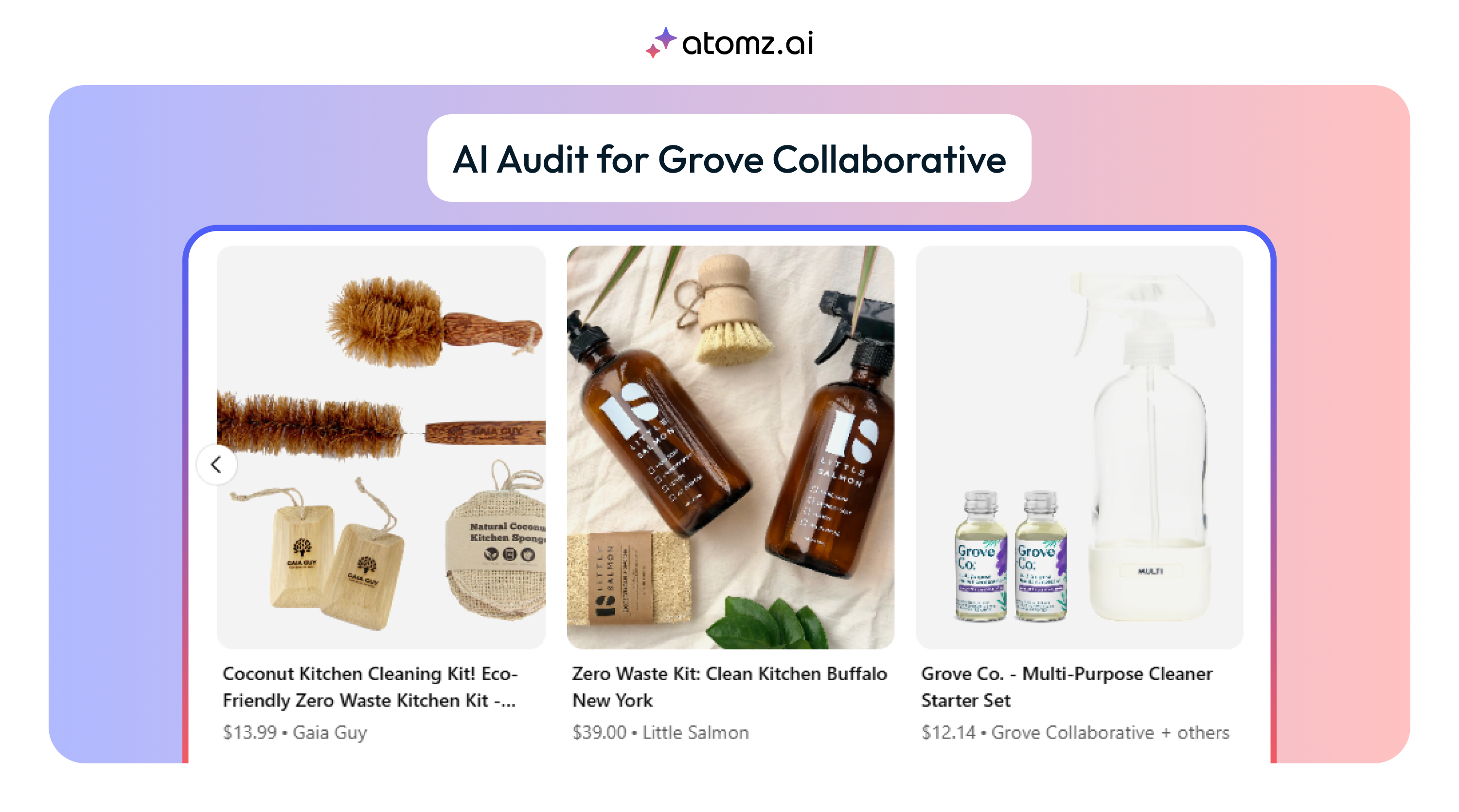
ON THIS PAGE
Stay Updated with latest in AI SEO
04 December 2025
Grove Collaborative pioneered the sustainable household products subscription model, building a $100M+ business around curated eco-friendly cleaning supplies and personal care items. Their "plastic-free by 2025" commitment and celebrity partnerships made them the go-to platform for conscious consumers.
But as AI shopping transforms how people discover sustainable products, subscription convenience doesn't guarantee search visibility. So I tested how Grove Collaborative actually performs when people use ChatGPT to shop for eco-friendly household items.
Grove Collaborative appeared in only 1 out of 11 purchase scenarios I tested. Despite being a sustainable household pioneer, they were completely absent from searches like buy eco-friendly cleaning products and shop green cleaning products online.
Before diving into Grove Collaborative's results, check how your brand performs across AI systems:
Test Your Brand's AI Visibility →
Takes 2 minutes. See how your brand ranks across different AI discovery platforms.
Test how your brand performs across the complete AI discovery spectrum with these 11 strategic queries:
1. Category Discovery (3 queries)
Tests: Do you own eco-cleaning categories?
2. Product Specificity (3 queries)
Tests: Do you appear for specific product types?
3. Platform & Channel (2 queries)
Tests: Do you capture channel-specific searches?
4. Competitive Positioning (2 queries)
Tests: How do you rank against competitors?
5. Category Expansion (1 query)
Tests: Do you appear in adjacent categories?
1 out of 11 queries (9% visibility)
Scoring approach: 8+ mentions = strong visibility | 4-7 = mixed results | under 4 = limited visibility
Here's what happened with each search:
Result:
Missing entirely
What appeared:
AspenClean Dishwasher Pods ($18.99), EcoRoots Zero Waste Cleaning Kit ($31.97), Blueland Multi-Surface Cleaner Starter Set ($6.99)
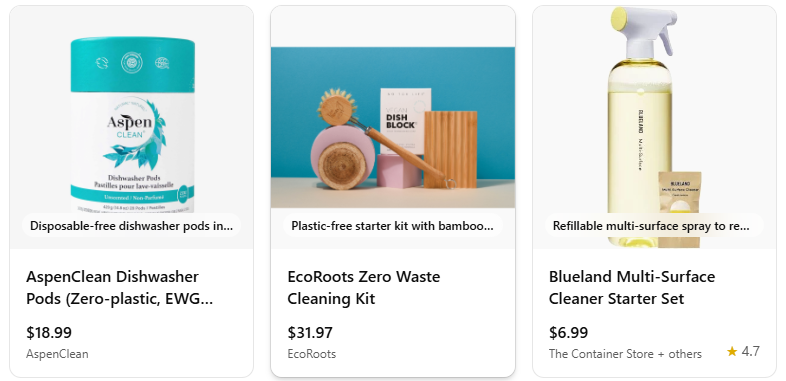
My take:
Shocking absence from the core category despite being a market leader
Result:
Missing entirely
What appeared:
Mrs. Meyer's Clean Day Multi-Surface Cleaner ($4.89), Method Grapefruit All-Purpose Cleaner ($4.48), Naturally It's Clean Multi-Surface Cleaner ($11.95)
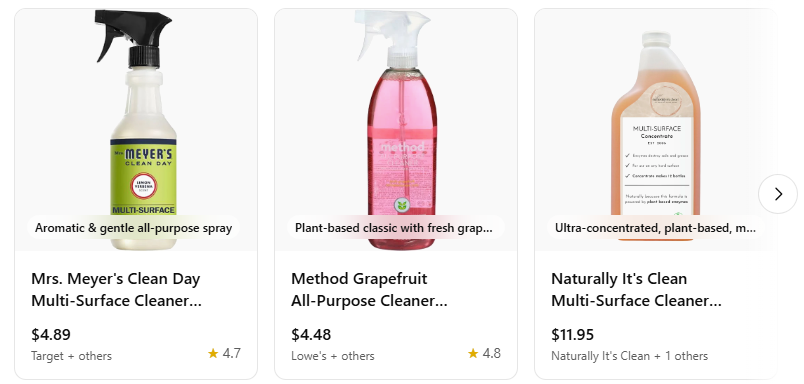
My take:
Missing budget-friendly natural cleaning segment entirely
Result:
Missing entirely
What appeared:
Upcycled Fishing-Net Dish Sponge ($18), Regenerative-Wool Scrub Sponge ($9), Eco-Strip Laundry Detergent Strips ($14.90)

My take:
Absent from broad sustainable household category searches
Result:
Missing entirely
What appeared:
Seventh Generation Lemon Chamomile All-Purpose Cleaner ($4.47), Dr. Bronner's Sal Suds Biodegradable Cleaner ($10.99), Koala Eco Natural Multi-Purpose Kitchen Cleaner ($10.99)

My take:
Missing from non-toxic positioning despite being the core brand promise
Result:
Missing entirely
What appeared:
Blueland Clean Essentials Kit ($46), EcoRoots Zero Waste Cleaning Kit ($31.97), Koala Eco Natural Floor Cleaner ($11.90)
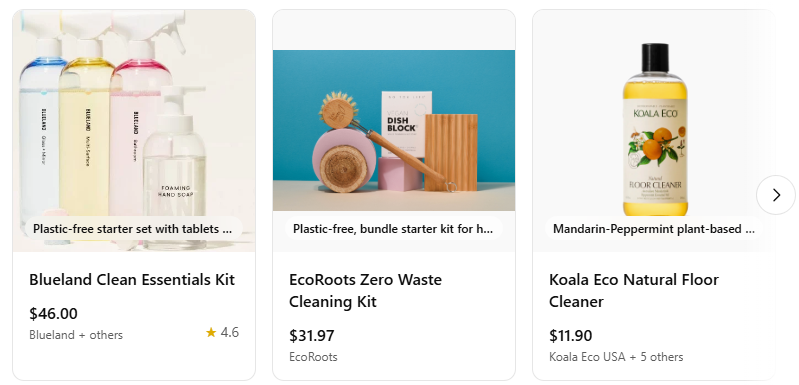
My take:
Absent from online green cleaning discovery
Result:
Missing entirely
What appeared:
AspenClean Unscented Natural Laundry Detergent ($28.99), Koala Eco Natural Laundry Wash ($24.90), Molly's Suds Original Laundry Detergent Powder ($22.99)
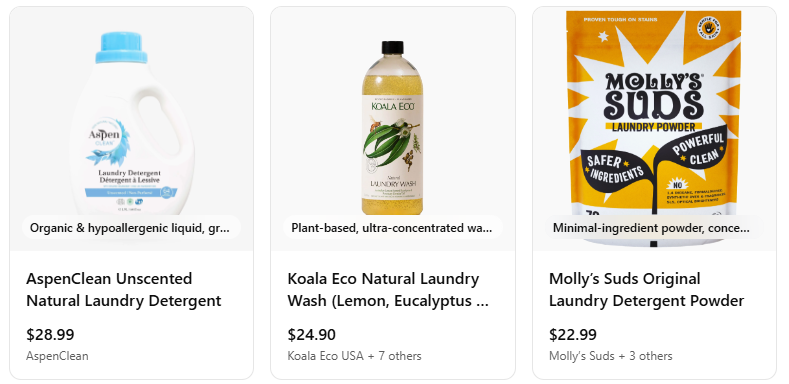
My take:
Absent from specific product category searches
Result:
Listed in comparison table
What appeared:
Zero Waste Store, EarthHero, Public Goods, Package Free Shop, Good Store (EcoGeek), Buy Me Once, DoneGood, Hive
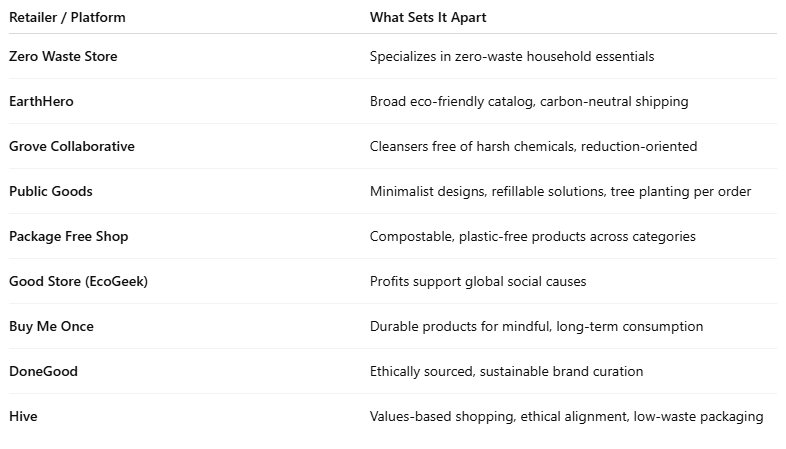
My take:
Good positioning as a platform for eco-friendly products, but buried in a comprehensive retailer list
Result:
Missing entirely
What appeared:
HBC Organics "Keeping It Clean" Subscription ($44.95), Free Living Co. Go Clean Monthly Box ($52.99), Mother's Earth Eco-Friendly Dishwasher Sheets ($49.95)
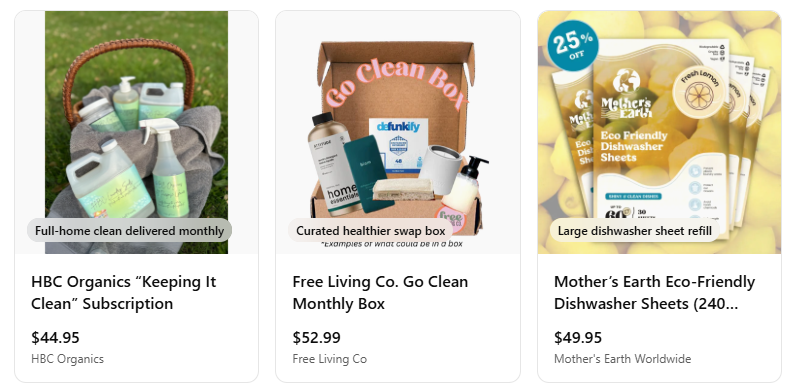
My take:
Shocking absence from subscription-focused searches despite subscription being the core business model
Result:
Missing entirely
What appeared:
Dr. Bronner's Sal Suds Biodegradable Cleaner ($9.99), Green Llama Eco-Friendly Glass & Mirror Cleaning Kit ($12.95), AspenClean Dishwasher Pods ($18.99)
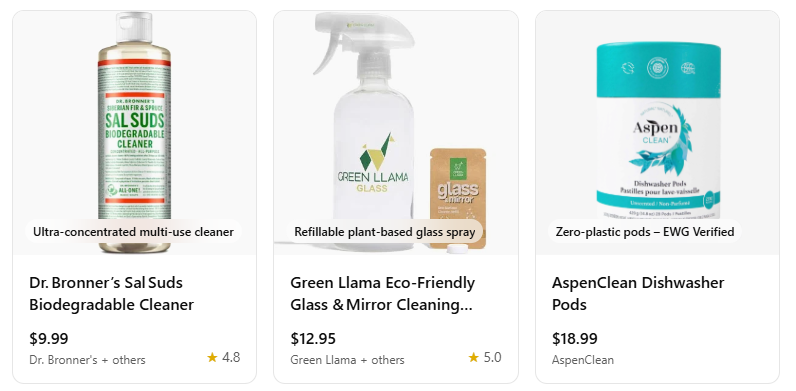
My take:
Missing competitive displacement opportunities against a major eco-brand
Result:
Missing entirely
What appeared:
EcoRoots Zero Waste Cleaning Kit ($31.97), Zero Waste Kitchen Kit — Wooden Dish Brushes ($29.99), Go For Zero Dish & Laundry Block (4-in-1) ($14)
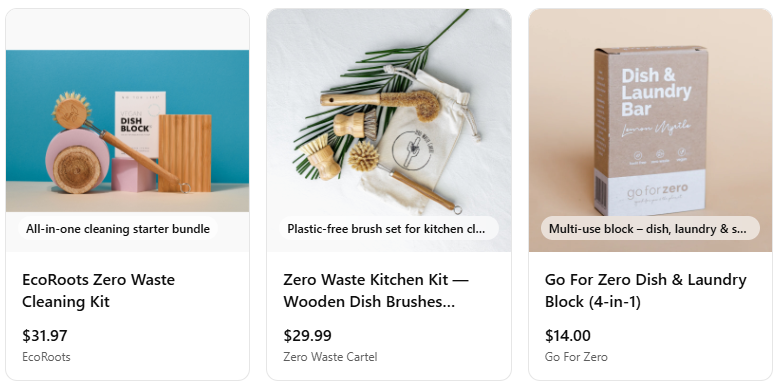
My take:
Missing from zero-waste positioning despite plastic-free commitments
Missing entirely
What appeared:
EcoRoots Zero-Waste Cleaning Kit ($31.97), Seek Bamboo Zero-Waste Cleaning Kit ($24), Green Llama Starter Home Cleaner Bundle ($29.95)
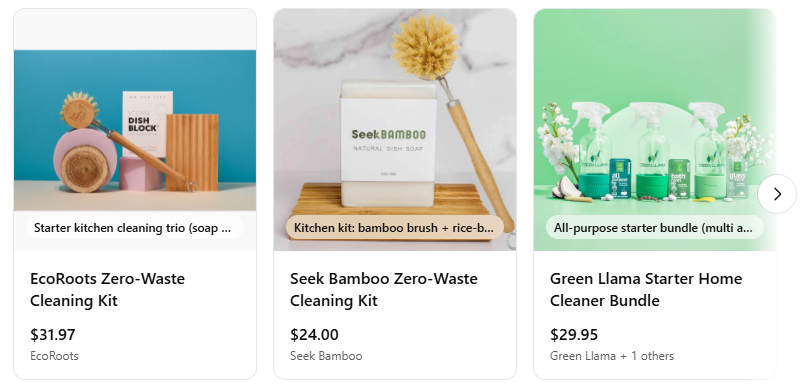
My take:
Missing from kit/bundle positioning despite curated product model
The standout finding: Blueland appeared in 3+ different search results, while newer brands like EcoRoots and AspenClean showed consistent presence. Grove Collaborative's absence suggests fundamental AI positioning issues.
Why this might be happening: Brands that appear consistently likely have more structured product data that AI systems can easily categorize. Despite pioneering the eco-cleaning subscription model, Grove doesn't appear in subscription-focused searches, indicating AI systems don't strongly associate it with their core business model. That means their product information is not optimized for AI discovery with clear material descriptions, consistent categorization, and structured data that ChatGPT can readily access.
Category Fragmentation: Smaller, specialized brands (AspenClean, Koala Eco, Dr. Bronner's) dominate individual product categories where Grove should have presence.
Category Performance Breakdown
Seeing similar patterns in your industry? Don't guess about your AI visibility.
Check Your Brand's AI Readiness →
See how your brand performs across multiple AI systems. Then manually test the 11-query framework above.
For platform models: Grove's 9% visibility shows that subscription convenience alone doesn't translate to AI discovery. Individual products need optimization independent of platform positioning.
For eco-brands: Sustainability credentials require constant reinforcement across all product descriptions and categories to maintain AI visibility.
For curated brands: Subscription curation models need to balance platform branding with individual product discoverability.
Check your brand's baseline AI visibility: Start Here →
Which categories are you missing from? Where do competitors appear instead of you?
Optimize your product information for AI systems. Check our LLM Audit Checklist for specific optimization steps.
Re-run tests monthly to track improvement and catch new patterns.
Based on this research, I've built several tools to help brands optimize for AI discovery:
• AI Readiness Scanner → Test your brand across multiple AI systems
• LLMs.txt Generator → Help AI systems understand your products
• Catalog Genius → Structure product data for better discovery
• AI Search Demo → See intelligent product discovery in action
Want your brand tested?
I'm building a research database of how brands appear in AI discovery systems.
Suggest a brand for analysis →
Testing approach:
Fresh ChatGPT-4 sessions, purchase-intent queries, conducted August 22, 2025. This analysis examines publicly available AI responses for research purposes.
Study limitations:
Single AI platform (ChatGPT-4), point-in-time snapshot, purchase-intent queries only. Results may vary across different AI systems and time periods.
Tools used: AI readiness scanner, LLMs.txt generator, and catalog optimization agent for analyzing brand discoverability patterns.
© 2025 AI Brand Intelligence by Atomz. Forward freely, just keep this notice intact.
Streamline your workflow, achieve more
Richard Thomas
Create buying intent instantly
Create buying intent before customers search. 25%+ conversion lift guaranteed.
Why Prompts Matter
AI Search That Converts 3x Better
Get the latest in AI-powered search, UX trends, and eCommerce conversions—straight to your inbo
No spam. Just powerful insights.
👉 Join thousands of growth-focused brands.

